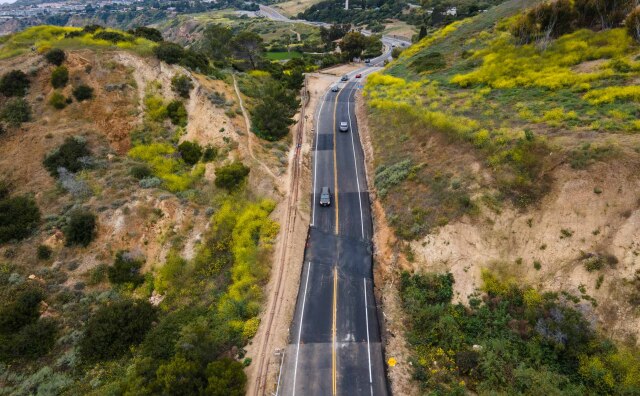For 49 years, the Twidwell family enjoyed idyllic living in the Portuguese Bend area on the Palos Verdes Peninsula. The marine layer that engulfed the rest of the peninsula stayed clear of their neighborhood so the weather was always sunny. Shari Twidwell’s two best friends were also her neighbors: bikes in each other’s front yards, in and out of each other’s homes with three sets of parents.
But, in the last two years, above average rainfall has led to unprecedented land movement, breaking up the neighborhood and relationships that have spanned decades.

Since last October, movement of the Portuguese Bend landslide complex has been dramatic. Twidwell said when they first moved into the neighborhood 51 years ago, land in the area was moving at 2 millimeters a year. Now, city officials say it’s shifting at 1 foot a week in some places, slowly tearing apart homes, roads, and other infrastructure.
“The sliding activity that has been going on that has been catastrophic is very new,” Twidwell said. “So, that's been eight months of sliding activity that has been out of this world. Totally bananas.”
The movement is so bad the historic Wayfarers Chapel had to be disassembled and moved out. Some driveways now drop 6 to 10 feet from the homes they once connected to. Utility poles lean ominously. Power and gas have been shut off indefinitely for more than 200 homes. And Gov. Gavin Newsom has declared a state of emergency.

The breaking point
KC King’s family bought the house next to Twidwell’s 30 days after she was born in 1974. Growing up in Palos Verdes, she said, was “special and magical.” But the magic has turned into a slow moving disaster.
In the last year, the backyard has “lifted up” and started “twisting.” To get into the back of the house, she said, you have to walk up the backyard.

When they cut off the gas, her mother wanted to stay. But then came the power shut-offs, prompting King to relocate the couple to where she now lives in Davis.
“I think that this is all just like, whoa, it's a lot to take, especially to be uprooted from the place that you thought you were going to live out the rest of your life,” King said.
Looking at alternatives
For Twidwell, the land movement has caused minimal damage to the home she grew up in. But she said it’s not just about her family.
“Any time that somebody says, ‘You know what, I give up. I give up. I'm done. I can't do this anymore,’ that's a loss for all of us,” she said. “It's not just that they're losing their home or the place that they wanted to spend the rest of their lives. But it's, we all lose. We lose a member of our family.”
Twidwell lives with her parents. Her 88-year-old father, she said, has advanced Parkinson’s disease, macular degeneration and is blind. Her mother, a nurse, cares for her father full time while Twidwell is his backup caretaker. Twidwell herself has multiple sclerosis. Their home was remodeled 20 years ago on the condition that “everything would be flat and everything, the counters, would be accessible in case anybody was in a wheelchair,” she said.
Now, the power shut offs have forced her to temporarily move her parents to a hotel.
As a therapist, Twidwell said, she can’t underscore the community aspect enough, adding, “My parents are in as good a shape as they are because they have community.”
She’s been exploring finding a battery for the solar panels they had previously installed. They won’t power up the entire house, but she said it will be enough for one or two rooms, a fridge and Wi-Fi up.

“We're sort of taking things bit by bit because we're kind of waiting for the next shoe to drop,” Twidwell said. “How else are they going to limit us or our abilities to live here, right?”
If the temporary plan works, she said she’ll look into adding more solar panels and buying a backup generator for cloudy days. But she knows it won’t be forever. Her family plans to remodel a home they own in Torrance to be ADA accessible “because we're pretty sure that once it starts to rain something else terrible will happen here.”
Can the land movement be slowed down?

City officials have said that while they cannot stop the land movement completely, they hope to slow it down. In June, crews began drilling holes in the ground to find where water had concentrated so they could install hydraugers to drain the ground. But when they drilled the holes, they found they were dealing with a deeper, much larger landslide.
Now, city officials say they’re moving away from the hydraugers project and prioritizing deep dewatering wells.
Meanwhile, all residents can do is watch their community continue to tear.
“If a tornado comes through and rips up your town it takes five minutes. If a hurricane comes, it takes maybe five days. If there's an earthquake, that's instantaneous and this is something that has no end that we can put our finger on,” King said. “I don't know when the end is, it is a ridiculous thing that can never end, but the landslide feels a little bit like that.”










